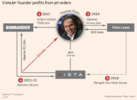flyingpotato
Well-Known Member
From inception they were intended for corporate fleet departments, not airline style operations. The recent effort to squeeze profits from operations when traditionally private/charter companies made the bulk of their profits from management and sales, has some downsides. The big company that shall remain unnamed that's embarked on squeezing profits from operations, when it previously hadn't, has found itself in acrimonious labour disputes, overworked staff, and high attrition rates. Not exactly what the Oracle would want to be known of. Yet when one looks at BNSF, and how the rail business now runs, it's not entirely unforeseeable that it may penetrate the once cozy corner of biz jet operations. Add to this 135 operating certificates combined with large scale operations, but without 121 level scrutiny or compliance. This seems like a perfect example of regulatory arbitrage. Who shall jump first? Regulatory agencies concerned with safety, or companies policing themselves more strictly than they're legally required to preserve profits? And can this attempt to profit from operations truly succeed?




